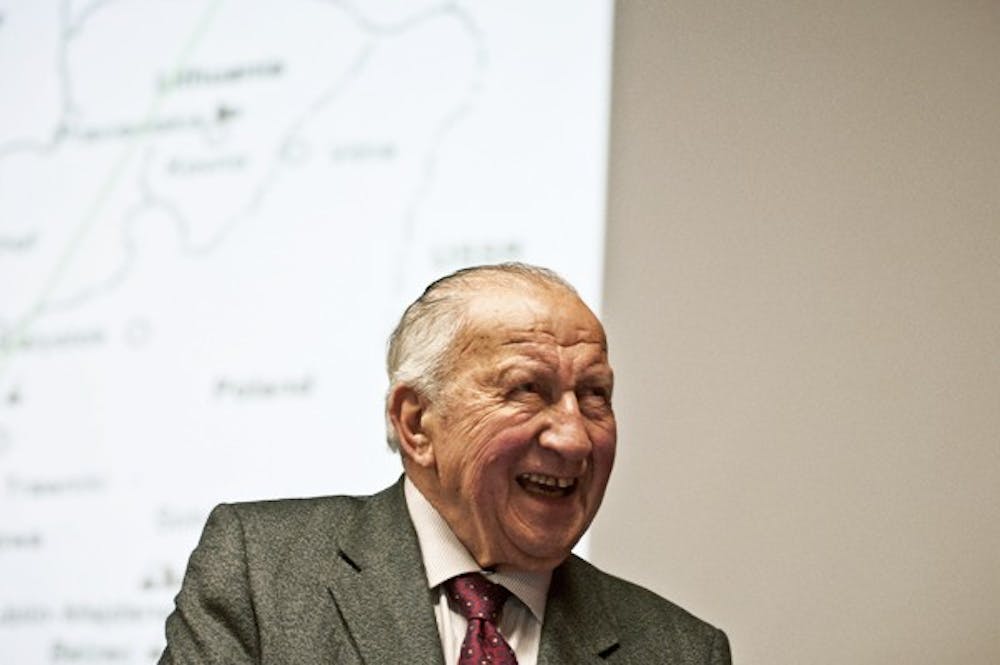Holocaust survivor Martin Loewenberg recalls story of survival
The majority of Holocaust survivors alive today were young children during the time where arguably the worst sins of humankind were committed.
Martin Loewenberg is one of those survivors.
Arrested and exiled from Germany at the age of 13, Loewenberg shared his story of survival and courage to an audience of students and community members Wednesday.
History department faculty member Eric Johnson invited Loewenberg to speak as an integral part of his HST 280 class: Nazi Germany and the Holocaust.
"I try to have a Holocaust survivor come to campus each fall to speak with my class," Johnson said. "It can be a difficult subject to talk about from an emotional standpoint, and I think having a survivor come to talk really moves the students."
Johnson has written several books about Nazi Germany but said talking about the subject all the time can be difficult for him to do all of the time.
"My father was a prisoner of war in Germany, so it's a very personal subject for me," Johnson said. "I'm glad someone like (Loewenberg) can come to speak about his actual first-hand experiences; a part of me thinks (Loewenberg) feels he has a duty to share his message to others."
Johnson said Loewenberg frequently talks to audiences about his experiences and is a frequent patron of the Holocaust museum in Farmington Hills.
"There were many attacks aimed at the Jews," Loewenberg said. "Many other 'undesirables' were killed, too; Jehovah's witnesses and the physically and mentally handicapped to name a few."
Loewenberg went on to explain some of the most horrific crimes, including extermination and controversial experiments.
"These crimes were performed by doctors – the people who are supposed to heal people -- and they were doing the exact opposite," he said.
Kristallnacht, also known as "The Night of Broken Glass," was a pivotal event in the Nazi regime during the 1940s.
Loewenberg said last Friday marked the 74th anniversary of that horrific night.
"Seventy-four years ago, they attacked the Jews; there were 93 people who were killed, and over 200 synagogues were destroyed all over Germany," he said. "They threw rocks through the windows of the schoolhouses we were in, and three of my classmates were hurt very badly."
The next day, members of the Gestapo arrested all males from the age of 18 to 60 years old, he said. Loewenberg's father was arrested, who was an officer in World War I and fought alongside the Germans.
More than 3,000 men were arrested that day, he said. After they were released, they were left without any type of identification, until they were eventually mailed identification cards, which were designated with a J to designate that they were Jewish.
They were also forced to wear patches on their outer clothing indicating their Jewish heritage.
On Dec. 8, 1941, Loewenberg said he and his family were finally evicted from Germany.
"They threw us out; they didn't want us anymore and said we were no longer allowed to live there," he said. "We were forced into boxcars and taken to Kassel, the capital city."
From there, they were transported to various labor and concentration camps, and Loewenberg said he never saw many of his family members after that.
"The guards split us up and told us we would see them later," he said. "What they mean by later was we would see them after they kill us, in heaven."
While his parents and younger twin brothers did not survive, Loewenberg was held in Lativa until he was transported to Sweden, where he was eventually liberated.
The event drew many students, including students who weren't even in HST 280.
Howell sophomore Niki Phillips was one of them.
"I've listened to a Holocaust survivor speak before, and it was very inspiring and interesting, so I wanted to take the opportunity to go again," she said.
Phillips said listening to the stories of these survivors continues to move her and makes her appreciate the life she has even more.




